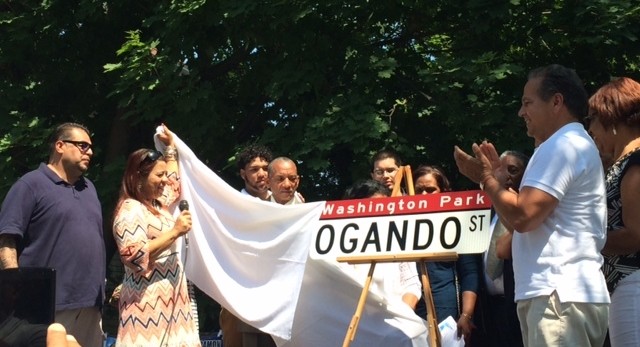Providence City Council names street after Dominican activist
On August 15th, about seventy people gathered on the South Side to celebrate the Providence City Council’s renaming of Hancock Street to Ogando Street in honor of Francisco Raymond Ogando, a Dominican activist who helped many local immigrants settle in New England, until he died unexpectedly...
On August 15th, about seventy people gathered on the South Side to celebrate the Providence City Council’s renaming of Hancock Street to Ogando Street in honor of Francisco Raymond Ogando, a Dominican activist who helped many local immigrants settle in New England, until he died unexpectedly in 2009.
Ogando Street is not far from Ogando’s former business on Broad Street, called Raymond’s Tailor Shop, where politicians and community members gathered to discuss local and international politics, or whether the New York Yankees or the Boston Red Sox had a better baseball team. Congressman David Cicilline, Providence Mayor Jorge Elorza, and Providence City Council President Luis Aponte are among Ogando’s customers and friends, and made speeches at the dedication, mostly in Spanish.
Liza Rodriguez is Ogando’s 33-year-old niece. She sits in the audience at the ceremony with her 12-year-old son Maurice Anderson and her dog Charlie. She is among about thirty family members present at the event, some coming from as far as the Dominican Republic. As a child, Rodriguez ran between the tailor shop and a clothing store two shops down the street where her mother worked. She says she played with the chickens behind the tailor shop or completed her homework among mounds and mounds of fabric while Ogando worked the sewing machines.

Ogando’s niece LIiza Rodriguez with her 12-year-old son Maurice.
“And he collected buttons so anytime I would go by, I always had a collection of buttons and he had a drawer. So if you ever needed a button put on, he could always find a match,” she said.
Rodriguez describes her uncle as a short man, about five foot four, with dark skin and a mustache.
“He was a very avid smoker, so ninety percent of the time when you’d pull up to the shop he was outside smoking his Marlboros and drinking his Bustelo coffee,” she added.
Rodriguez says Ogando always had a pot of coffee brewing in the shop, while customers and politicians went in and out. The small business was the unofficial Rhode Island headquarters for the Dominican Liberation Party. Past and present Dominican presidents, like Leonel Fernández and Danilo Medina, paid visits to the shop. In 2004, Ogondo was appointed Vice Consul of the Dominican Republic in Rhode Island by presidential decree.
Rodriguez says Ogando finished tailoring many customers’ garments on the day they were needed. When her older brother Elvin graduated from high school, Ogando ran into the Veterans Memorial Auditorium in Providence, clasping Elvin’s suit. And Elvin was able to put it on just in time to walk on stage and receive his diploma.
Stitching things together at the last minute wasn’t Ogando’s only erratic business practice. Activism often compelled Ogando to randomly close his shop, Gonzalo Cuervo, the senior adviser at the Rhode Island Secretary of State’s Office, explained at the ceremony.
“And his business suffered a lot because he would close, he would lock it up and go out, go to City Hall, or go to the State House, or help somebody out at any hour,” Cuervo said. “And so his business was kind of inconsistent at times, because he thought he was a social worker but he wasn’t getting paid to be a social worker.”
Councilwoman Carmen Castillo introduced a resolution to the Providence City Council last year to rename a street after Ogando in one of the neighborhoods she oversees. The resolution got passed this June, before yesterday’s dedication ceremony. Castillo says she used to hang out in the shop, and talk with Ogando about their shared experiences of leaving the Dominican Republic to live here in Rhode Island. She says it’s important that there was someone like Ogando to show her and other immigrants the ropes.
‘When they came here, they don’t know anything,” she said. “He tried to help in the best way, and not only for Dominican people. Everybody can come to his business.”
Castillo says Ogando didn’t only show people how to get food and medical care. He liked to take people to karaoke bars, and when he wasn’t singing Spanish music there, he was playing it on the radio in his shop.
Rodriguez says Ogando was somewhat of a father figure to her two brothers. He supported her single-mom, even her gambling ventures.
“My mom told him I had a dream and I want to play these numbers, but I don’t have any cash. He’s like, I’ll give you twenty-dollars, and my mom was like, no. He’s like, don’t worry about it, we’re friends. My mom was like, I’ll take your twenty dollars, I’ll play the numbers and if I win, I’ll give you half. Who would have thought that they would have hit and won two thousand dollars,” Rodriguez said.
Ogando and Rodriguez’s mother celebrated by bringing a few drinks back to the shop.
Six years ago, Ogando died unexpectedly from a heart attack in his younger brother Ruben’s arms. Ogando was only 49 years-old. Rodriguez says more than 2,000 people attended his funeral. There was a two-hour wait just to get a glimpse of Ogando’s body.

Ogando’s brother Ruben speaks at the ceremony. He’s continuing to run Ogando’s shop.
Ogando’s memory doesn’t only live on the newly dedicated street. Rodriguez says Ruben continues to run Ogando’s shop, which now sits on Cranston Street in the West End of Providence. Here, the same sewing machines Ogando used still hum.

